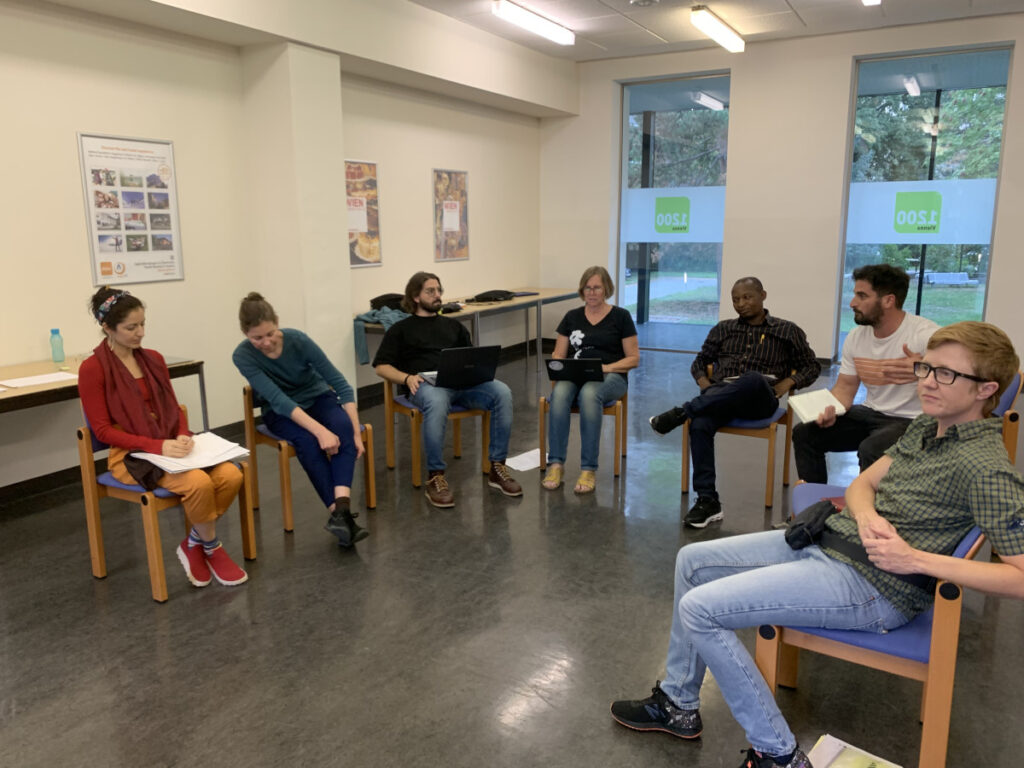
Activities
Tools development Laboratory

Over the course of the project, the participating organisations will develop several tools that should encourage organisations to look at their own functioning with the aim to question their organisation’s values, behaviours and structures. A self-assessment tool in being developed with the aim to guide organisations in going through this process of self-reflection.
At the same time some other tools are being developed to improve certain aspects of the International Voluntary Service programmes from a decolonised perspective:
An online preparation module for long term volunteers taking into account an intersectional approach;
Revised guidelines for long term exchanges;
Revised environmental sustainability guidelines.
The team working on the development of the tools met in October in Vienna to work on the prototypes of the self-assessment tool and the online preparation module for long term volunteers. While we are still in the middle of our ongoing process of defining what decolonisation means for IVS organisations we are trying to bring together some key issues in these tools but it stays a very difficult process to pinpoint the things we have to change in our organisations and to create the change we want to see.
During the Tools Lab, the participants visited the Weltmuseum where a local guide gave a tour of the temporary exhibition “Extinctions!?” . A good reflection moment on the connection between climate change and colonisation but also on our colonial past and how culture and musea are testimonies of this colonial past and keep a certain colonised narrative alive.
“ I have had the privilege of being included in the project almost since the beginning and I’ve seen all its phases, which makes me feel sort of an insider in a way that I’ve seen lots of struggles along the way already. But I’m definitely learning from these tools’ creation process. Hopefully, we will keep modifying our tool kit continuously and it will evolve according to the inputs of organizations who will use it.”
Decolonise IVS! MOOC: volunteer pre-departure training for meaningful engagement

To support the pre-departure training of volunteers, the project has been creating a Massive Open Online Course (MOOC). What can we expect from the MOOC? At what stage is the work now? Let’s ask Gianluca Bellotto, a member of the coordinating team of the work for MOOC.
Why do you think it’s important to develop another pre-departure tool for long term volunteers within the Decolonise IVS! project?
We think it’s worth, if not fundamental, to give volunteers as many tools as possible to fill their experience and co-operation in the community with meaning. With meaning we mean responsible mindset and concepts and feelings that empower inclusion and solidarity. Considering this, we propose the Decolonise! approach as a puzzle piece to be merged with other elements, with the aim of fostering winds of change. This tool is aimed to sensitize young people. It has been designed specifically for them and empowered by the learning potential of the online software. Youngsters, with their energy and enthusiasm are the fuel of the volunteering world and, in general, our future, so we consider them the most important target to guide and exalt.
When do you think it will become available and how would you recommend organisations to use this module?
We have elaborated a draft and will next ask for feedback from a testing group. We expect the tool to be ready during June–July. The technical part is a challenge for us, we don’t really have web developing skills, and the platform we’re using is all to discover. We’ll ask for help from professionals for the final realization, but first, we need to understand how to merge what we aim to communicate with the digital frame. Surely we’ll do our best to give young volunteers a modern learning tool.
The organizations should administer the course to the volunteers before the departure. The MOOC is directed to all volunteers about to start their experience but can also be used during the volunteering period or after it. Even if it’s a one-hour engagement, they need to take their time to reflect on the topic.
Can you provide a brief overview of the key learning objectives and topics covered in the MOOC?
From deconstructing the structures of colonialism, we aim to inspire a framework of decolonial thinking on the line of inclusion and equality. The first object is comprehending what IVS means and the cultural diversity that characterizes it. Then, learning the concept of coloniality (the colonial mindset), with its collateral forms of discrimination, and how it negatively affects the voluntary world. Lastly, we aim at inspiring the volunteers to reflect on their own motivation to volunteer.
Can you share some insights from the development process that have shaped the design of the MOOC?
Organizations contributed to the MOOC through online meetings, in-person workshops, and external support. Each one designed a module, defining content and format of the paragraphs. All of that is processed through the framework of HOP, the platform dedicated to fostering online learning in European volunteering programs. The design had been “digital based” from the start, with the purpose of creating an interactive and stimulating online resource. We conceived a tool aimed to make departing volunteers reflect on their motivations, working as a stimulus to change their mindset. It is based on communicating concepts, but also submitting various activities to keep the minds on the spot.
